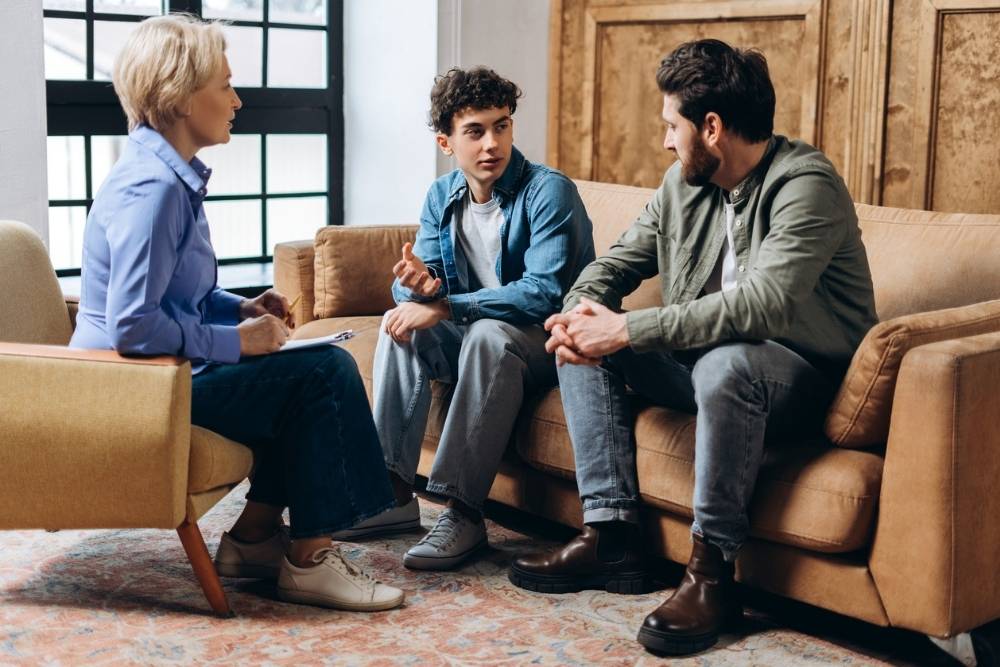Substance use disorder (SUD) and alcohol use disorder (AUD) never affect just one person. These conditions frequently ripple through entire families, disrupting trust, communication, and emotional connection. When one member struggles with addiction, the rest of the family often struggles, too—sometimes in silence. Family therapy, a key part of many addiction treatment programs, gives everyone involved a structured and safe space to begin the healing process.
Why Is Family Therapy Essential to Growth?
In many families affected by addiction, difficult issues are often avoided or buried under years of misunderstanding and pain. Integrated therapy helps bring various areas of concern into the open for everyone involved, including, but not limited to:
- Healing trauma
- Broken trust and betrayal
- Unresolved anger, resentment, and emotional exhaustion
- Fear of relapse and future uncertainty
- Financial and practical strain
- Guilt, shame, and self-blame
- Communication breakdowns and fear of confrontation
- Enabling and codependency
- Boundary violations and difficulty setting limits
- Emotional detachment or withdrawal
- Parenting and family role disruptions
- Grief and loss
- Conflicting recovery expectations
- Pressure to reconcile
- Relearning trust and accountability
- Managing triggers and emotional regulation
According to the Substance Abuse and Mental Health Services Administration, therapy allows members to express these and other feelings in a guided environment, with the help of a professional who ensures the conversation remains constructive. The goal isn’t to revisit the past for punishment, but to learn from it—to see how patterns developed, where boundaries were crossed, and how each person was affected.
When these issues are unaddressed, families often get stuck in cycles of mistrust, codependency, or denial. The person in recovery may feel shame and isolation, while loved ones may harbor anger or fear that prevents them from reconnecting. Family therapy offers a path through this emotional gridlock by helping each person to stop repeating harmful patterns, understand their role in the relationship dynamic without judgment, and develop tools for more effective communication, empathy, and boundary-setting.
How Can You and Your Family Find Common Ground and Move Forward?
The therapeutic process allows each person to learn how to speak and listen in ways that promote mutual respect. A qualified professional helps reframe the conversation away from blame and toward shared goals—such as rebuilding trust, creating safety, and supporting long-term recovery.
- For example, a parent might express that while supporting their child through addiction treatment, they’ve felt frustrated over years of financial strain or worry about relapse. The person in recovery might respond by acknowledging their parent’s pain and sharing what they’re doing to rebuild stability—such as attending meetings, following their treatment plan, or seeking employment.
- Or perhaps an adult child shares some factors from their upbringing that made them feel unsafe, bullied, or otherwise in conflict because of a troubled household. The parent recognizes these points and notes the various ways they could have been more supportive or minimized the upheaval.
This exchange helps each side understand the other’s perspective and fosters compassion instead of defensiveness. Here are a few other ways families and individuals in recovery form bridges to understanding:
Learn New Communication Skills
Family members often learn to use “I” statements—such as “I feel hurt when…” instead of “You always…”—to express themselves without accusation. This small linguistic shift reduces tension and keeps discussions focused on emotions rather than fault.
Set Healthy Boundaries
These are essential for both recovery and family stability. A loved one might set a limit like, “I’ll support you emotionally, but I can’t give you money.” Boundaries help everyone respect each other’s autonomy and responsibilities, reducing codependency and resentment.
Create a Recovery-Supportive Environment
Families can collaborate to make the home a healthier space—removing triggers such as alcohol, attending family recovery meetings together, or celebrating milestones in sobriety. These acts signal solidarity and shared commitment to healing.
Acknowledge Each Other’s Efforts
Recognizing progress, no matter how small, reinforces hope. A simple acknowledgment—“I’ve noticed how hard you’re working to stay sober” or “I appreciate that you’re showing up for therapy”—rebuilds trust faster than grand gestures.
Through these processes, family members begin to see one another not as adversaries, but as individuals who are all navigating pain and growth in their own ways.
Healing Doesn’t Always Mean Reconciliation
While family therapy aims to strengthen relationships, healing doesn’t always mean that everyone will—or should—remain closely connected. In some cases, family members may choose different paths, either temporarily or permanently. For instance, a loved one might decide to maintain distance to protect their own mental health, or the person in recovery might recognize that some relationships are too triggering or unhealthy to maintain.
This doesn’t mean therapy has failed. On the contrary, one of the most profound outcomes of family therapy is the understanding that healing takes many forms. Sometimes it looks like reconciliation and renewed closeness. Other times, it means establishing a healthy distance and mutual respect.
Each individual deserves peace and the opportunity to move forward free from the cycles of guilt, anger, and enabling that often accompany addiction. Whether together or apart, the insights gained in therapy help every member develop resilience, compassion, and personal growth.
How Ivory Plains Can Help
At Ivory Plains’ inclusive addiction rehabilitation program in Adair, Iowa, our board-certified professionals provide numerous resources for family resolution during recovery. Talk to a member of our admissions team to learn more.





